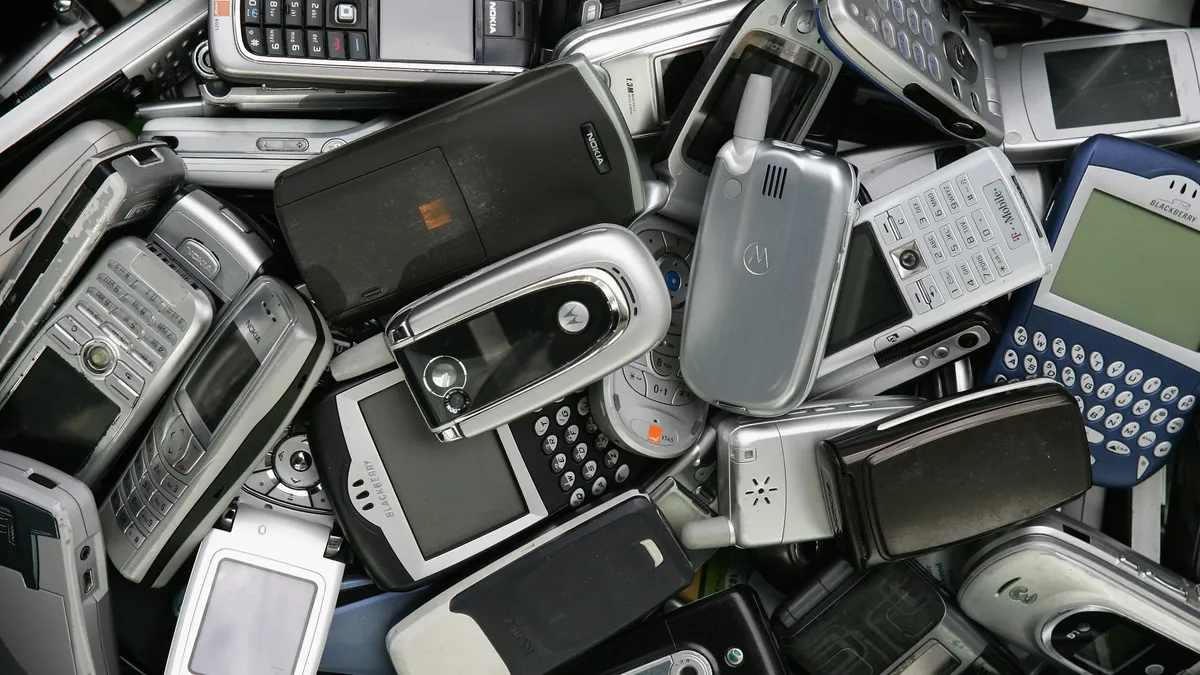Dive Brief:
- Trashie, a mail-in takeback service for used clothing and other textiles, is expanding its services to add electronics collection.
- Trashie’s Tech Take Back Box is meant for consumers to collect items like phones, cords, chargers, laptops, tablets and other electronic devices. The company provides a dedicated small or medium-sized collection box and a UPS shipping label for a cost to the consumer between $20 and $25. Consumers then receive up to $40 in TrashieCash, which they can redeem for rewards and deals from brands.
- The service builds on Trashie’s existing takeback bag service for clothing, which helped the company collect about 4 million pounds of textile waste this year, said CEO Kristy Caylor in an email. Trashie projects it will collect at least 2 million pounds of e-waste in the coming year.
Dive Insight:
E-waste is one of the fastest growing waste streams in the country, according to the U.S. EPA. Trashie’s electronics takeback expansion is an opportunity to collect items consumers have in their homes but aren’t sure what to do with, Caylor said.
This builds on the company’s service in textile recycling; consumers are becoming more aware of fast fashion’s impact on the environment, but textile recycling infrastructure remains limited in the U.S. Trashie, which launched in February, is an offshoot of For Days, a clothing startup also run by Caylor.
“We want to ignite a mass-scale shift in recycling behavior across many household categories where landfill waste is particularly concerning,” she said in an email. “Consumption isn’t slowing down any time soon, and our goal is to help mitigate its environmental impact.”
The company has partnered with entertainment, dining, travel and lifestyle brands to build out what it calls its “rewards marketplace.” Though customers pay a cost upfront for the takeback bags or boxes, offering “rewards that people actually want” has helped drive customers to the platform, she said.
Trashie directly manages both the electronics and textiles recycling process through contracts with a “vetted network of recycling partners” in North America that provide the company with its own designated space and handling protocols within those facilities, she said.
When electronics arrive at a facility, workers identify items that can be refurbished while also handling the sortation, secure data destruction and material recovery process.
Trashie’s in-house shredding system includes an SSI four-shaft shredder, magnetic eddy current systems, and optical sorters, Caylor said. The steel, aluminum, copper, plastics, and circuit boards then go to refineries and recycling facilities.
Trashie’s move into electronics recycling mirrors other companies that aim to meet rising demand for e-waste diversion options. Larger companies like ERI, an ITAD and electronics recycling company, last year had already announced plans to build new electronics recycling centers.
Trashie will continue focusing on textiles recycling as it expands into electronics. Its textiles processing centers, also located in North America, hire workers to manually sort and grade each item based on factors like quality and material. The majority of reusable or resalable items are sold in North America, while items that can’t be reused are downcycled into things like carpet padding, insulation and other applications. A portion of the fiber “goes to fiber-to-fiber recycling” applications, Caylor said. Trashie tracks each item through a data management system.
Recycling and waste groups are anticipating significant new recycling, repair and reuse options will open up for textiles by 2030, especially in light of California becoming the first state in the nation to enact an EPR for textiles program.
Trashie partnered with fashion brands including Steve Madden and Marine Layer this year to further expand its takeback programs. Marine Layer hopes the partnership will increase how much of its clothing gets recycled by five-fold and allow for the company to gather more specific recycling data.
Trashie joins other companies that see brand partnerships as a key way to divert clothing from disposal. Debrand, a Canadian company that offers sorting and logistics services for end-of-life apparel and footwear, opened its first U.S.-based sorting facility earlier this year.
This story first appeared in the Waste Dive: Recycling newsletter. Sign up for the weekly emails here.















